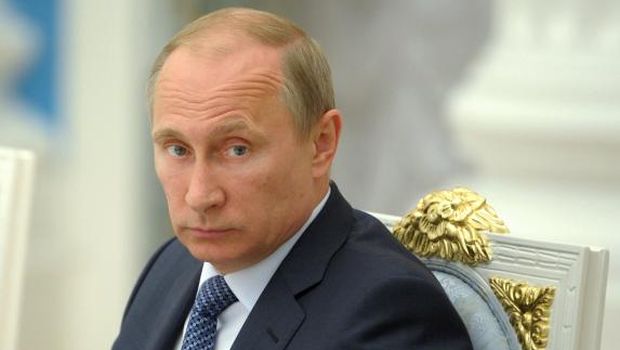Russian President Vladimir Putin’s photo can be seen regularly on the cover of Western news magazines, and international television channels offer constant footage on various aspects of his checkered career. As the latest bête-noire of Western political and intellectual circles, Putin is also the subject of several rushed-into-print biographies.
The main theme in this new genre, let’s call it Putiniana, is that the Russian leader, nurturing dreams of empire, can be cast as the quintessential anti-West icon of our times.
A closer look at the current Putin-bashing campaign, however, reveals surprising weaknesses in the narrative built around his person. To start with, the photos used often show Putin wearing sunglasses made by a famous US designer of eye-wear, and the clothes he wears are clearly designed by a French maison de haute couture. In addition, Western TV footage often shows Putin jogging—a typical Western ritual—in order to demonstrate his robust health, another Western obsession.
Not only does Putin not look like the oriental potentate he is portrayed as, but he might well remind people of the late Hollywood actor Dan Duryea in one of his classical gangster roles. Putin is Western in other ways. He is president in a political system copied from the US model, and maintains his hold on power more or less in the same way that many Western leaders do—that is to say with support from a circle of business tycoons, media glitterati and techno-bureaucratic apparatchiki.
The style in which Putin’s cult of personality is projected is Western, even Madison Avenue. It consists of high visibility through frequent photo-ops, an endless supply of catch-phrases and speeches crafted to sound intelligent but without saying anything of significance.
In no way does Putin resemble the typical Soviet leader, say Leonid Brezhnev, let alone Josef Stalin; nor could one mistake him for a Tsar, whether Nicholas II or Ivan IV.
Western commentators often describe Putin as a chess-player to emphasis his “oriental-ness.” However, Putin has always behaved more like a poker-player, bluffing his way through at a time of hesitation by adversaries in the game at hand. Right now, he is exploiting US weakness to enhance his position at home and abroad.
The persona that Putin has concocted operates within a Western-style capitalist system. Last year, Western investment in the Russian economy was estimated at around 200 billion US dollars, an all-time record. At the same time, Russian funds held in Western banks was estimated at almost 2 trillion dollars, much of it owned by 100 or so oligarchs.
In England, capitalism started with pirates. In continental Europe, robber barons played a similar role. In Russia, oligarchs perform that function. The result is the same. The Russian economy is heavily dependent on Western investment, technology and markets. Russia’s principal source of revenue consists of oil and gas exports to the West, worth some 160 billion dollars in 2013. Even if Putin’s plan to capture part of the Chinese market succeeds, it would be worth no more than 40 billion dollars.
A visitor to Russia is quickly struck by the passion that many Russians have for the West, and dream, as they have always done, of a “common European space” between the Atlantic and the Urals, sometimes even to Vladivostok.
The idea of isolating Russia, currently fashionable in Western capitals, would be hard to implement in any meaningful way. How could anyone isolate the world’s largest country with the biggest number of neighbors?
Russia is a neighbor both of the United States and Iran, not to mention Germany and Japan. Ever since it gained its independence in the 15th century, Russia has played a role in all major events affecting the European continent. While maintaining its distinct identity, culturally speaking, Russia has been part of the European civilization, and a major contributor to Western literature, music, art, architecture, cinema and dance.
The current tension between Russia and the West seems rooted in three elements. The first is represented by the split in Christendom that led to the separation of the Eastern Orthodox Church from the Church of Rome in 1054 CE. The second is the emergence of an imperial system in Russia at a time when other parts of Europe, emerging from the debris of the Holy Roman Empire, started shaping a string of nation-states. Finally, a more recent element of discord came with the fall of the Soviet Empire in 1991. The Western powers saw that as a defeat for the Russian nation, whereas in reality, as a nation, Russia had been one of the victims of the Communist empire.
The chaotic period that followed the fall of the USSR fostered some bitterness against Western democracies. By 1992, Russian gross domestic product had been reduced by almost 50 percent. In 1995, the devaluation introduced by Prime Minister Yevgeny Primakov triggered an inflationary avalanche never before seen in Russian history.
Putin has built his personal narrative as a savior of the Russian nation, a man who restored the dignity of the state in the face of plundering oligarchs and their foreign, often western, partners.
During the Cold War, anti-Communism often morphed into anti-Russian sentiment. Today, too, opposition to aspects of Putin’s foreign policy sometimes degenerates into a rejection of Russia as a nation. In that regard, Putin has performed his historic function, some of it necessary and useful in its time, and is now fated to peak out as a politician. Despite current approval rates, according to most polls, Putin’s political star is on a declining trajectory. It is important for the Western democracies, indeed for the whole world, not to push Russia into a corner in order to punish Putin. The real challenge that Europe faces is how to develop a new relationship with Russia, one that takes into account its peculiarities along with its affinities with the European civilization.
